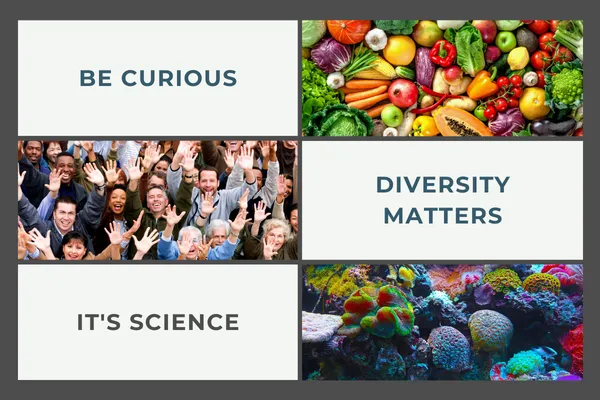BLOG
Get new content straight to your inbox!

Why aren't we celebrating our diversity?
“I dunno why you always have to be judging me because I only believe in science.” - Esqueleto (Nacho Libre)
Biology is the scientific study of life.
We are all biologists - objective, constantly observing, experimenting and forming conclusions about our world. There are multiple fields within biology, but there are two very common disciplines that we use almost daily. (please excuse the simplification here to make my point)
The first discipline is taxonomy, it is the science of categorization or classification (1). This practice uses characteristics from physical attributes to genetic codes to classify living beings into a hierarchical nomenclature system. As young children we are taught to assign names and categorize things based on their similarity to each other. We learn who is in our family based on blood relations, and who is in our community based on geography, common interests, culture, and/or religion.
The second discipline is ecology, it is the study of relationships between living organisms and with their physical environments (2). In school we learn about food chains, how all living things from the smallest microbes to the largest mammals play important roles in ecosystem function and survival [cue Elton John's ‘Circle of Life’]. There are many organizations and global initiatives focused on environmental conservation because we have learned how invaluable biodiversity is and the crisis we face if it is lost.
So why don’t we appreciate diversity within our own species?
One word - FEAR. 😨
When we encounter something unfamiliar, the inner taxonomist compiles our observations, learned information and past experiences to classify it as safe or threatening. Our inner ecologist uses this assessment to determine our relation to the new encounter before deciding how to respond. For example, we would behave very differently encountering a squirrel vs. a bear on a hike, or a person walking towards us on a sidewalk holding a purse vs. holding a knife.
The examples above are admittedly very polarized, so how does this relate back to human diversity?
Well, when we meet someone who is from a foreign country, with skin that does not look like ours, speaking a language we do not understand...what do we do?
We start as the taxonomist – compiling information from our observations, what we've been taught, and our own experiences. Without any familiarity, information might only come from sensationalist headlines and skewed social media content, creating an opaque layer of fear that fogs our assessment.
Through our fear, we may pass judgement based on perceived ethnicity or nationality with terms like terrorist, ultraconservative, radical, corrupt, or human rights violator. Regardless of the mental image that comes to your mind with the list above, I suspect these are not descriptors you want to be associated with. Conversely, fear can prey on our own insecurities, tainting our perceptions of a new person's behavior as anti-social, bossy, demanding, attention seeking, or unfriendly, instead of shy, assertive or nervous.
If the new person is a neighbor or a work colleague, it is not an acute situation where you can turn down a side street or climb a tree to avoid the encounter. As an ecologist, how can we foster a positive relationship with someone perceived as a threat to ourselves or our way of life?
Let's be better scientists.
It's in our nature to make sense of the world as both a taxonomist and an ecologist. Together they give us the tools to understand our environment and form relationships with the living beings we share it with.
The path forward requires us to be good biologists following scientific best practices. This means being objective and open minded, accepting that our perceptions are a hypothesis, not fact.
Let's approach the unfamiliar with curiosity and exploration BEFORE forming conclusions.
Imagine if our inner taxonomist gathered information about the new neighbor or work colleague with curiosity instead of querying our mental database of emotionally charged tweets? That initial encounter would look more like a friendly conversation including questions like; "Where did you work before starting here? What languages do you speak? Is this your first Canadian winter experience? What kind of food do you enjoy? Do you follow any sports or tv series?"
NOTE: "What are you?" and "No really, where are you from?", did not make the list.
You may not have much in common, but approaching the unfamiliar with curiosity gives opportunities to know people as beautiful, unique individuals – which we all deserve.
Without the cloud of fear, a curious observer provides better data for our inner ecologist to make well informed decisions and foster inclusive team dynamics for the community or department.
DISCLAIMER: When referring to 'approaching the unfamiliar', it is in the context of a safe setting. Please do not approach bears or people with knives. Thank you.
If you are interested in learning more about my programs, getting free resources or signing up for great content right to your inbox, you can sign up to subscribe HERE.
